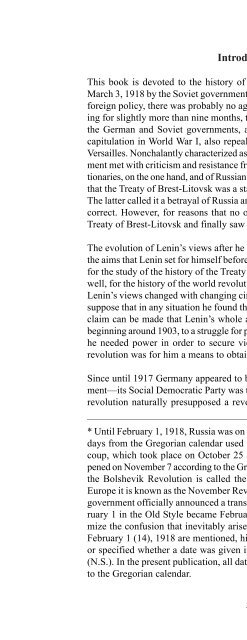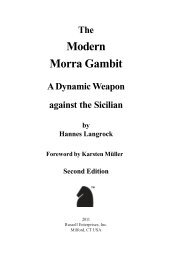Lenin, Trotsky, Germany and the Treaty of Brest-Litovsk The ...
Lenin, Trotsky, Germany and the Treaty of Brest-Litovsk The ...
Lenin, Trotsky, Germany and the Treaty of Brest-Litovsk The ...
Create successful ePaper yourself
Turn your PDF publications into a flip-book with our unique Google optimized e-Paper software.
<strong>Lenin</strong>, <strong>Trotsky</strong>, <strong>Germany</strong> <strong>and</strong> <strong>the</strong> <strong>Treaty</strong> <strong>of</strong> <strong>Brest</strong>-<strong>Litovsk</strong>– for organizing a Communist coup in <strong>Germany</strong> itself, on which, as everyoneassumed, <strong>the</strong> ultimate victory <strong>of</strong> socialism in <strong>the</strong> world would depend.Now <strong>Lenin</strong> began to assign a completely different role to himself in <strong>the</strong> worldCommunist movement. It was important for him to bring about a world revolutionunder his own direct leadership <strong>and</strong> to preserve his position <strong>of</strong> leadershipwithin <strong>the</strong> International. For <strong>Lenin</strong>, <strong>the</strong> German revolution took second place to<strong>the</strong> already victorious revolution in Russia. Even more than that: <strong>the</strong> revolutionin <strong>Germany</strong> must not happen too quickly, since when it did, <strong>the</strong> center <strong>of</strong> gravity<strong>of</strong> <strong>the</strong> Communist world would shift to <strong>the</strong> industrialized West <strong>and</strong> <strong>Lenin</strong> wouldbe left behind as nothing more than <strong>the</strong> head <strong>of</strong> <strong>the</strong> government <strong>of</strong> an “underdeveloped,”“backward,” <strong>and</strong> “uncultured” country.It is in <strong>the</strong> light <strong>of</strong> <strong>Lenin</strong>’s changed views about <strong>the</strong> revolution in <strong>Germany</strong> thatone must examine <strong>the</strong> whole history <strong>of</strong> <strong>the</strong> negotiations in <strong>Brest</strong>-<strong>Litovsk</strong> betweenDecember 1917 <strong>and</strong> March 1918, which concluded with <strong>the</strong> formation <strong>of</strong> a peacetreaty between Russia, on <strong>the</strong> one h<strong>and</strong>, <strong>and</strong> <strong>Germany</strong> <strong>and</strong> <strong>the</strong> o<strong>the</strong>r Central Powers,on <strong>the</strong> o<strong>the</strong>r.<strong>Lenin</strong>’s position at <strong>the</strong>se negotiations – his insistence on forming a “Tilsit truce”for <strong>the</strong> sake <strong>of</strong> a respite from war with <strong>Germany</strong> – seems so reasonable that onecan only marvel at <strong>the</strong> adventurism, naiveté, <strong>and</strong> carefree idealism <strong>of</strong> all <strong>of</strong> hisopponents, from <strong>the</strong> Bukharin-led Left Communists to <strong>Trotsky</strong> with his formula“nei<strong>the</strong>r war nor peace.” To be sure, <strong>Lenin</strong>’s position seems correct mainly becauseit appeals to notions that most people find familiar: a weak army cannotfight against a strong one; if resistance is impossible, a peace treaty must be signedin <strong>the</strong> face <strong>of</strong> an ultimatum. But this is an ordinary person’s way <strong>of</strong> thinking, nota revolutionary’s. Such a way <strong>of</strong> thinking would not have made it possible toseize power in November 1917 <strong>and</strong> to hold on to it against a coalition <strong>of</strong> socialistparties as <strong>Lenin</strong> had done, with <strong>Trotsky</strong>’s help, in <strong>the</strong> days following <strong>the</strong> takeover.Indeed, such a way <strong>of</strong> thinking would have made it impossible to be a revolutionary.For some reason, <strong>the</strong> entire core <strong>of</strong> <strong>the</strong> party, with <strong>the</strong> exception <strong>of</strong><strong>Lenin</strong>, was against signing <strong>the</strong> <strong>Treaty</strong> <strong>of</strong> <strong>Brest</strong>-<strong>Litovsk</strong>; in fact, a large number <strong>of</strong>party functionaries supported <strong>Trotsky</strong>. And no one viewed <strong>the</strong> state <strong>of</strong> things aspessimistically as <strong>Lenin</strong>. What were all <strong>of</strong> <strong>the</strong>se people thinking, <strong>the</strong>n? Whatwere <strong>the</strong>y counting on?<strong>The</strong> revolution <strong>and</strong> <strong>the</strong> revolutionaries were subject to <strong>the</strong>ir own special laws.<strong>The</strong>se laws were perceived by <strong>the</strong> majority <strong>of</strong> <strong>the</strong> population as incomprehensible,deranged, <strong>and</strong> irrational. But when it ab<strong>and</strong>oned <strong>the</strong>se laws, <strong>the</strong> revolutionperished. In <strong>the</strong>m lay its only source <strong>of</strong> power <strong>and</strong> its only hope for victory. <strong>Lenin</strong>stepped back from <strong>the</strong>se laws for <strong>the</strong> sake <strong>of</strong> preserving his personal power <strong>and</strong>leadership in <strong>the</strong> world Communist movement. From <strong>the</strong> point <strong>of</strong> view <strong>of</strong> absoluteCommunist interests, <strong>the</strong> <strong>Treaty</strong> <strong>of</strong> <strong>Brest</strong>-<strong>Litovsk</strong> was a catastrophe. It unequivocallydestroyed any chance <strong>of</strong> an immediate revolution in <strong>Germany</strong>, <strong>and</strong>8








